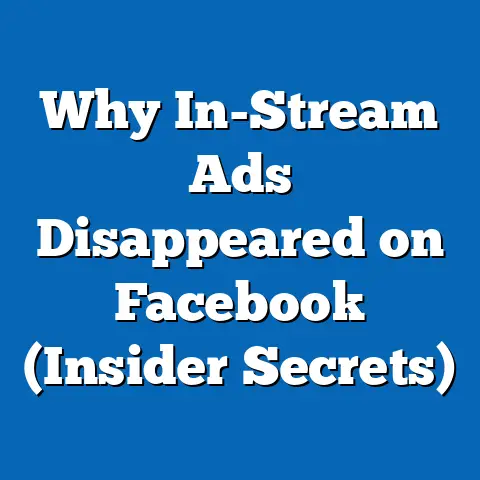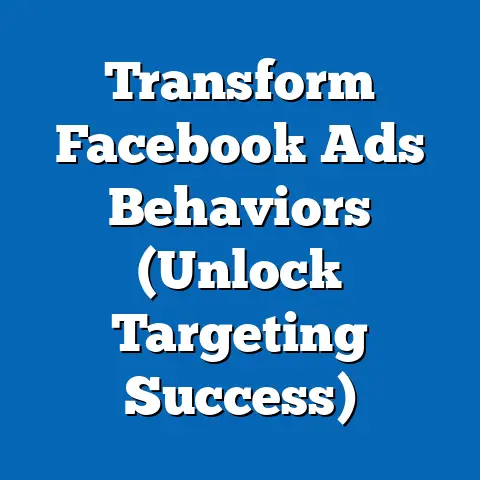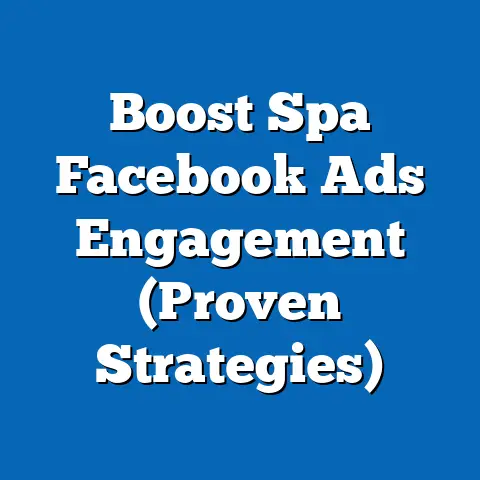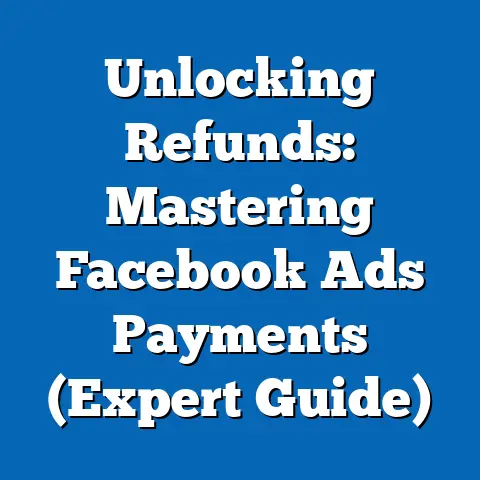Why Companies Pull Ads from Facebook (Insights Revealed)
The digital advertising world is a vibrant, bustling marketplace, a digital bazaar where brands jostle for attention amidst a cacophony of content.
Imagine it as a colossal, ever-shifting mosaic, each tile representing a potential customer, and the mortar holding it all together being the platforms that connect them.
At the heart of this mosaic, Facebook once stood as an unshakeable cornerstone, a place where businesses could reliably reach billions.
But lately, cracks have started to appear.
More and more, we’re seeing companies choosing to step away, to pull their advertisements from the platform.
Why?
What’s causing this exodus from the once-dominant social media giant?
The Landscape of Digital Advertising
The evolution of digital advertising has been nothing short of revolutionary.
In the early days of the internet, banner ads and pop-ups were the norm, often intrusive and ineffective.
But as technology advanced and social media took hold, the game changed.
Suddenly, advertisers had access to unprecedented levels of user data, allowing for highly targeted campaigns that could reach specific demographics, interests, and even behaviors.
Facebook emerged as a dominant player in this new landscape.
With its massive user base, sophisticated targeting capabilities, and diverse advertising formats, it became a go-to platform for businesses of all sizes.
I remember when I first started running Facebook ads for a local bakery.
The ability to target people who lived within a 5-mile radius, who liked baking and had recently engaged with similar businesses, was mind-blowing.
We saw a significant increase in foot traffic and sales, and Facebook quickly became an indispensable part of our marketing strategy.
According to Statista, Facebook’s advertising revenue reached over $116 billion in 2023, a testament to its continued importance in the advertising ecosystem.
Its user base spans across diverse demographics, making it an attractive platform for businesses targeting a wide range of audiences.
But Facebook isn’t the only player in town.
The digital advertising landscape is fiercely competitive.
Google, with its search engine dominance and vast network of websites, remains a formidable rival.
Instagram, also owned by Meta, offers a visually-driven advertising experience that appeals to a younger demographic.
TikTok has exploded in popularity, particularly among Gen Z, and its short-form video format has proven to be highly engaging for advertisers.
Emerging platforms like Snapchat, Twitter (now X), and LinkedIn also offer unique advertising opportunities, each with its own strengths and weaknesses.
The key takeaway here is that advertisers have choices.
They’re not beholden to any single platform, and they’re constantly evaluating which channels offer the best return on investment.
As the reasons for pulling ads from Facebook become more compelling, these alternative platforms stand to benefit.
Takeaway: Facebook’s dominance in digital advertising is undeniable, but it operates in a highly competitive landscape.
Advertisers are increasingly willing to explore alternative platforms if they perceive a decline in value or an increase in risk.
The Reasons Behind Pulling Ads
While Facebook remains a powerful advertising platform, a growing number of companies are choosing to pull their ads, citing a variety of reasons.
These reasons can be broadly categorized into brand safety concerns, ad performance issues, and political and social issues.
Let’s delve into each of these areas in more detail.
Brand Safety Concerns
Brand safety refers to the practice of ensuring that a brand’s advertising doesn’t appear in contexts that could damage its reputation.
This includes avoiding placement alongside hate speech, misinformation, violent content, or anything else that could be perceived as offensive or harmful.
In the early days of social media advertising, brand safety was often an afterthought.
Advertisers were primarily focused on reaching as many people as possible, with less concern for the specific environments in which their ads appeared.
But as social media platforms grew and became more complex, the risk of brand safety incidents increased.
I’ve seen firsthand how quickly a brand can be damaged by an unfortunate ad placement.
Imagine a luxury car brand’s ad appearing next to a post promoting violence or hate speech.
The association, however unintentional, can be devastating.
Customers may perceive the brand as insensitive, uncaring, or even complicit in the harmful content.
Several high-profile incidents have highlighted the importance of brand safety on Facebook.
In 2020, a coalition of civil rights groups organized a boycott of Facebook, urging companies to pull their ads in protest of the platform’s handling of hate speech and misinformation.
Companies like Unilever, Coca-Cola, and Starbucks joined the boycott, sending a strong message to Facebook about the importance of addressing these issues.
Another example involves ads appearing alongside conspiracy theories or fake news articles.
Even if the brand has no connection to the content, the association can erode trust and damage its reputation.
Consumers are increasingly aware of the content they consume online, and they’re holding brands accountable for the environments in which they advertise.
Takeaway: Brand safety is a critical concern for advertisers on Facebook.
The risk of appearing alongside harmful or inappropriate content can damage a brand’s reputation and erode customer trust.
Ad Performance Issues
While brand safety is a significant concern, it’s not the only reason why companies are pulling their ads from Facebook.
Many advertisers are also experiencing declining return on investment (ROI) from their campaigns.
In the past, Facebook ads were often seen as a cost-effective way to reach a large audience and drive conversions.
But as the platform has become more crowded and competitive, the cost of advertising has increased, while the effectiveness of ads has sometimes decreased.
Several factors can contribute to ad performance issues on Facebook.
One is ad fatigue, which occurs when users become desensitized to the same ads over time, leading to lower engagement rates.
Another is the increasing complexity of the Facebook algorithm, which can make it difficult for advertisers to reach their target audience effectively.
I’ve seen this happen with several of my clients.
They start out with great results from their Facebook ads, but over time, the performance starts to decline.
They try different targeting options, ad creatives, and bidding strategies, but the results just aren’t the same.
Another challenge is the increasing competition for ad space on Facebook.
As more businesses flock to the platform, the cost of advertising rises, making it more difficult for smaller companies to compete.
In some cases, the cost of acquiring a customer through Facebook ads can be higher than the lifetime value of that customer, making the investment unsustainable.
Furthermore, changes to Facebook’s privacy policies, such as the introduction of App Tracking Transparency (ATT) on iOS devices, have made it more difficult for advertisers to track user behavior and measure the effectiveness of their campaigns.
This has led to a decline in the accuracy of attribution data, making it harder for advertisers to optimize their campaigns for ROI.
Takeaway: Declining ROI and increasing costs are driving some companies to pull their ads from Facebook.
Factors such as ad fatigue, algorithm complexity, competition, and privacy changes are contributing to these performance issues.
Political and Social Issues
In today’s polarized political and social climate, Facebook has become a battleground for competing ideologies and misinformation.
The platform’s handling of political content, hate speech, and social issues has drawn criticism from all sides, and it’s become a significant concern for advertisers.
Many companies are wary of associating their brands with Facebook’s platform due to its perceived role in spreading misinformation and amplifying harmful content.
They fear that advertising on Facebook could be seen as an endorsement of the platform’s policies and practices, even if they disagree with them.
I remember the controversy surrounding the 2016 US presidential election, when Facebook was accused of allowing Russian actors to spread disinformation and influence the outcome of the election.
This incident sparked a broader debate about the role of social media platforms in shaping public opinion and the responsibility of advertisers to ensure that their ads don’t contribute to the problem.
In recent years, several companies have pulled their ads from Facebook in response to specific political or social issues.
For example, some companies boycotted Facebook in protest of its handling of hate speech, while others pulled their ads in response to the platform’s policies on political advertising.
The decision to pull ads from Facebook for political or social reasons is often a difficult one.
Companies must weigh the potential benefits of advertising on the platform against the risk of alienating customers or damaging their reputation.
They must also consider the impact of their decision on Facebook’s policies and practices.
The key takeaway here is that advertising on Facebook is no longer just a business decision.
It’s also a political and social statement.
Companies must be aware of the potential implications of their advertising choices and be prepared to defend their decisions.
Takeaway: Facebook’s handling of political content, misinformation, and social issues is a growing concern for advertisers.
Many companies are wary of associating their brands with the platform due to its perceived role in spreading harmful content.
The Impact of Pulling Ads
The decision to pull ads from Facebook is not one to be taken lightly.
It can have significant short-term and long-term effects on a company’s brand visibility, customer engagement, and overall marketing strategy.
Let’s examine some of the potential impacts.
In the short term, pulling ads from Facebook can lead to a decrease in brand visibility and reach.
Facebook is still a massive platform with billions of users, and advertising on the platform can be an effective way to reach a large audience.
When a company pulls its ads, it loses access to this audience, which can result in a decline in website traffic, leads, and sales.
I’ve seen this happen with several companies that have chosen to boycott Facebook.
They experience a temporary dip in their key metrics, but they often find ways to compensate for the loss by investing in alternative marketing channels.
However, in the long term, pulling ads from Facebook can have a positive impact on a company’s brand reputation.
By taking a stand against harmful content or unethical practices, a company can demonstrate its values and build trust with its customers.
This can lead to increased brand loyalty and positive word-of-mouth marketing.
Another potential benefit of pulling ads from Facebook is that it can force companies to diversify their marketing strategies.
Many businesses have become overly reliant on Facebook advertising, neglecting other important channels such as email marketing, search engine optimization (SEO), and content marketing.
By pulling their ads, they’re forced to explore these alternative channels, which can lead to a more well-rounded and sustainable marketing strategy.
Competitors and alternative platforms also stand to benefit from the shift away from Facebook advertising.
As companies pull their ads, they often reallocate their budgets to other channels, which can drive up demand and prices on those platforms.
This can create opportunities for smaller players to compete with Facebook and gain market share.
Takeaway: Pulling ads from Facebook can have both positive and negative impacts on a company’s brand visibility, customer engagement, and overall marketing strategy.
It can lead to a temporary decline in reach, but it can also improve brand reputation and force companies to diversify their marketing efforts.
Case Studies of Notable Companies
To illustrate the impact of pulling ads from Facebook, let’s examine some case studies of notable companies that have made this decision.
One example is Patagonia, the outdoor clothing and gear company.
In 2020, Patagonia joined the boycott of Facebook, citing concerns about the platform’s handling of hate speech and misinformation.
The company announced that it would temporarily halt all advertising on Facebook and Instagram, and it urged other businesses to do the same.
Patagonia’s decision was widely praised by consumers and activists, who saw it as a bold statement against unethical business practices.
The company’s brand reputation was further enhanced, and it saw an increase in sales and website traffic as a result.
Another example is Ben & Jerry’s, the ice cream company known for its progressive values.
In 2020, Ben & Jerry’s also joined the boycott of Facebook, citing similar concerns about hate speech and misinformation.
The company announced that it would suspend all advertising on Facebook and Instagram in the United States, and it called on Facebook to take stronger action to address these issues.
Ben & Jerry’s decision was also met with positive feedback, and the company saw an increase in brand awareness and customer loyalty.
The company’s commitment to social justice resonated with its target audience, and it was able to strengthen its brand identity as a result.
However, not all companies have had the same experience when pulling ads from Facebook.
Some businesses have found it difficult to compensate for the loss of reach, and they’ve seen a decline in sales and website traffic as a result.
The key takeaway here is that the decision to pull ads from Facebook is a complex one, and it’s important to carefully consider the potential impacts before making a decision.
Companies must weigh the potential benefits of advertising on the platform against the risk of alienating customers or damaging their reputation.
Takeaway: Case studies of companies like Patagonia and Ben & Jerry’s demonstrate the potential benefits of pulling ads from Facebook.
By taking a stand against unethical practices, companies can enhance their brand reputation and build trust with their customers.
The Future of Facebook Advertising
The future of advertising on Facebook is uncertain.
The platform faces significant challenges, including declining user engagement, increasing competition, and growing concerns about brand safety and political content.
Facebook is responding to these challenges by investing in new technologies and features, such as augmented reality (AR) and virtual reality (VR), which could create new opportunities for advertisers.
The company is also working to improve its content moderation policies and address concerns about hate speech and misinformation.
However, it remains to be seen whether these efforts will be enough to restore trust and attract advertisers back to the platform.
Many companies are exploring alternative advertising channels, such as TikTok, Snapchat, and LinkedIn, which offer unique targeting capabilities and engaging content formats.
The rise of the metaverse could also have a significant impact on the future of Facebook advertising.
Meta, Facebook’s parent company, is investing heavily in the metaverse, and it hopes to create a new virtual world where people can interact, socialize, and shop.
If the metaverse takes off, it could create new opportunities for advertisers to reach consumers in immersive and engaging ways.
Ultimately, the future of Facebook advertising will depend on the platform’s ability to adapt to changing user behavior, address concerns about brand safety and political content, and innovate with new technologies and features.
Takeaway: The future of Facebook advertising is uncertain, but the platform is working to address its challenges and innovate with new technologies and features.
The rise of the metaverse could also create new opportunities for advertisers.
Conclusion
In conclusion, the trend of companies pulling ads from Facebook is driven by a complex interplay of factors, including brand safety concerns, ad performance issues, and political and social issues.
While Facebook remains a powerful advertising platform, it faces significant challenges that are causing some businesses to reconsider their investment.
The decision to pull ads from Facebook is not one to be taken lightly.
It can have significant short-term and long-term effects on a company’s brand visibility, customer engagement, and overall marketing strategy.
Companies must carefully weigh the potential benefits of advertising on the platform against the risk of alienating customers or damaging their reputation.
As the digital advertising landscape continues to evolve, companies must be prepared to adapt their strategies and explore alternative channels.
They must also be mindful of the ethical implications of their advertising choices and be prepared to take a stand against harmful content or unethical practices.
The broader implications for the digital advertising industry are significant.
The trend of companies pulling ads from Facebook highlights the importance of brand safety, ethical advertising, and responsible content moderation.
It also underscores the need for advertisers to diversify their marketing strategies and explore alternative channels.
In the end, the future of Facebook advertising will depend on the platform’s ability to address these challenges and innovate with new technologies and features.
Companies must stay informed about the latest developments and be prepared to adapt their strategies accordingly.
So, what does this mean for you?
As a business owner, marketer, or consumer, it’s essential to think critically about the platforms we use and the messages we support.
The choices we make in the digital marketplace have real-world consequences, and it’s up to each of us to ensure that we’re contributing to a more ethical and responsible online environment.






